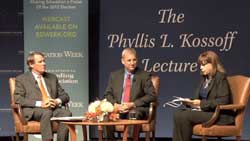Filed Under > Policy
Kossoff Lecture at TC Features Education Debate Between Advisers to Candidates Obama and Romney
Debating at TC, the education advisors to Obama and Romney differ on the role of the federal government, funding, NCLB and more
By Patricia Lamiell
In a debate in Teachers College’s Cowin Conference Center on October 15, Jon Schnur and Phil Handy, top education advisors to President Barack Obama and his Republican challenger, former Massachusetts Governor Mitt Romney, staked out clear philosophical differences over the role of the federal government in funding education and incentivizing reforms in testing and teacher preparation. They also clashed on the future of the federal No Child Left Behind Act and educational testing.
The TC debate, entitled, "Taking the Election to School" was designed to spotlight the candidates’ views on education, a topic many feel has received short shrift during the campaign. Coverage appeared in The Huffington Post, Scientific American and Education Week.
